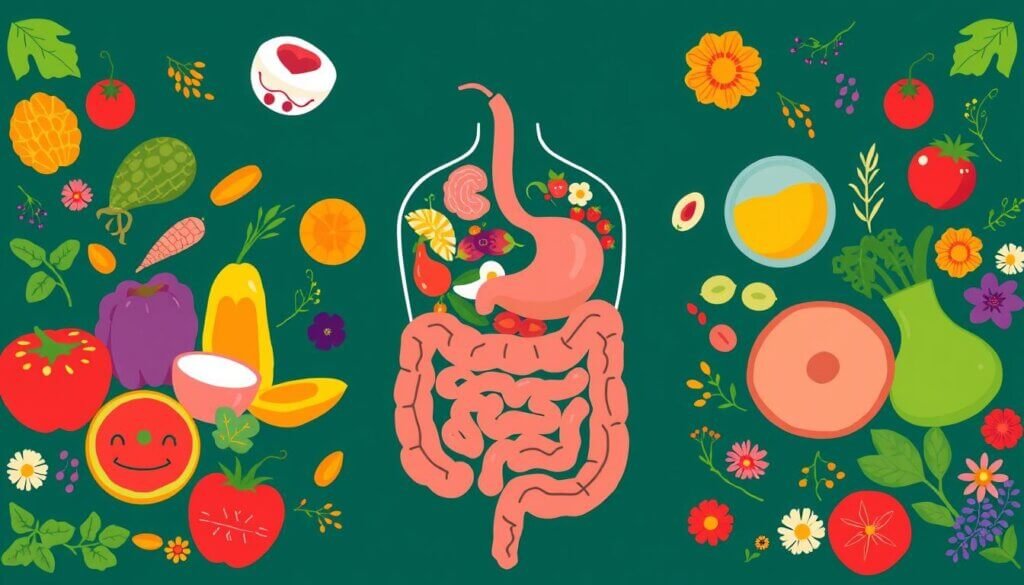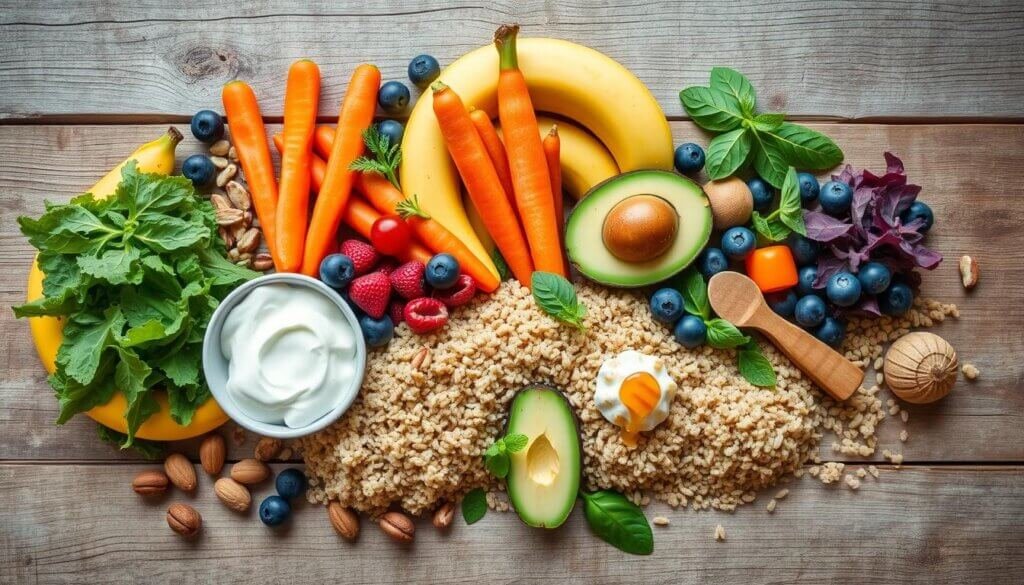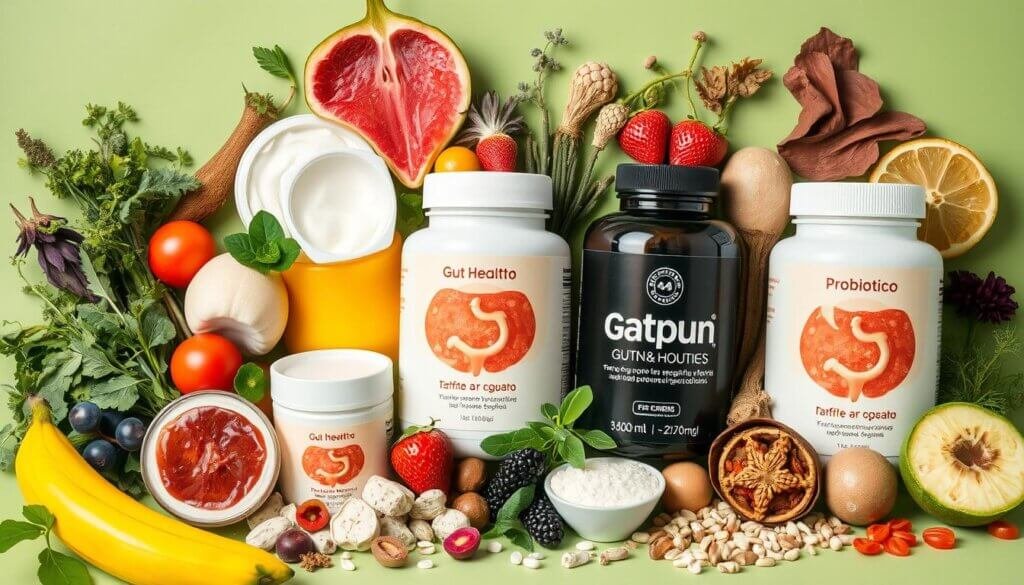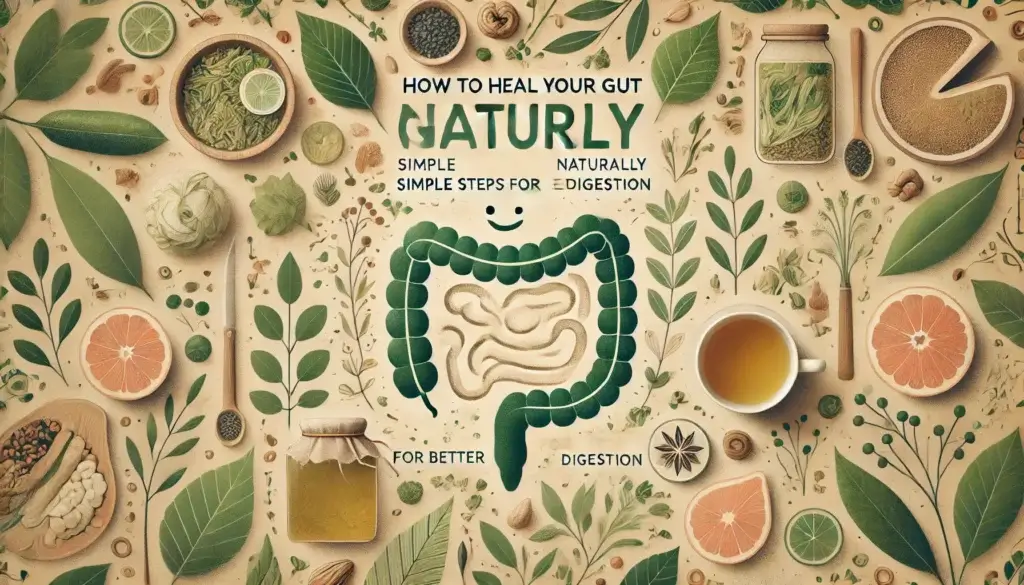Did you know that 70 million Americans suffer from digestive issues annually? If you are one of them, you are not alone. The good thing is you can repair your gut naturally. By understanding my gut microbiome and simply making some lifestyle changes, this can dramatically improve your health.
In this guide, we examine how good bacteria can support your digestive health. We’ll also look at signs of an unhealthy gut and the gut-brain connection. Out of this, you will find a practical, science-backed method for resetting your digestive system. These include daily habits, natural supplements, and probiotics. The journey begins towards sound digestion and healthier YOU.

Key Takeaways
- Understand the importance of a balanced gut microbiome for overall health
- Identify the signs of an unhealthy gut and the impact on your well-being
- Learn about the gut-brain connection and how to support this vital link
- Discover simple daily habits and lifestyle changes to support gut healing
- Explore the best natural supplements and probiotics for gut repair
- Create a sustainable gut health routine for long-term digestive wellness
- Improve digestion and reduce common digestive issues naturally
Understanding Your Gut Microbiome and Its Impact on Overall Health
Your gut microbiome is a community of tiny living things in your stomach. It’s key to your health. This group of bacteria, viruses, and fungi affects your digestive system health.
The Role of Beneficial Bacteria in Digestive Health
Good bacteria, or probiotics, help break down food and absorb nutrients. They also help you have regular bowel movements and a strong immune system. A healthy gut microbiome balance can stop many stomach problems, from bloating to irritable bowel syndrome (IBS).
Signs of an Unhealthy Gut Microbiome
- Frequent digestive discomfort, such as gas, bloating, or diarrhea
- Persistent fatigue or low energy levels
- Skin issues like acne, eczema, or rashes
- Mood changes, including anxiety or depression
- Difficulty maintaining a healthy weight
The Gut-Brain Connection Explained
The gut and brain are closely linked. Your gut microbiome affects your brain and mental health. This connection lets your gut send signals to your brain, influencing mood and behavior. Keeping your gut microbiome balance healthy can lead to clearer thinking, less stress, and better well-being.
Understanding your gut microbiome's role is crucial. By supporting its balance, you can improve your digestive system health and overall energy.
Common Causes of Poor Gut Health
Part of feeling good is having a happy gut. But, there are a lot of things, that can wreak havoc on your gut health. Identifying the culprit is the first step to starting your gut repair diet, taking gut healing diets, and consuming the best foods for gut health.
Bad diets are a big problem. Overconsuming processed foods, sugar, and unhealthy fats can throw your gut out of balance. Not eating ample fiber and whole foods also damages your gut’s health.
Stress is yet another major issue to your gut. It can disrupt your intestine working properly and cause inflammation and a disturbance with your gut bacteria.
| Potential Gut Health Saboteurs | Impact on Gut Health |
|---|---|
| Antibiotics | Disrupt the balance of gut bacteria, leading to reduced diversity and an overgrowth of harmful microbes. |
| Environmental toxins | Exposure to chemicals, pollutants, and other environmental toxins can impair gut function and contribute to inflammation. |
| Certain medications | Some medications, such as proton pump inhibitors and nonsteroidal anti-inflammatory drugs (NSAIDs), can damage the gut lining and disrupt the gut microbiome. |
By knowing what hurts your gut, you can start to fix it. A good gut repair diet and lifestyle changes can help a lot.
“Gut health is the foundation of overall health and well-being. By addressing the root causes of poor gut health, you can unlock the door to a healthier, more vibrant you.”
Essential Gut Health Tips for Natural Healing
Fixing your gut health naturally is a big step towards better health. Simple habits, lifestyle changes, and stress management can help. These steps support your gut’s recovery and keep your digestion working well.
Daily Habits That Support Gut Recovery
Here are some daily habits for a healthier gut:
- Drink plenty of water to stay hydrated and support digestion.
- Consume probiotic-rich foods like yogurt, kefir, sauerkraut, and kimchi.
- Eat a fiber-rich diet with plenty of fruits, vegetables, and whole grains.
- Chew your food thoroughly to aid digestion and nutrient absorption.
- Engage in regular physical activity to promote gut motility and circulation.
Lifestyle Changes for Optimal Digestion
These lifestyle changes can greatly improve your gut health:
- Manage stress through relaxation techniques like meditation, deep breathing, or yoga.
- Prioritize quality sleep, aiming for 7-9 hours per night.
- Limit your intake of processed foods, refined carbohydrates, and artificial additives.
- Avoid unnecessary antibiotic use and consider taking probiotic supplements.
Stress Management Techniques for Gut Health
Stress can harm your gut’s balance. Try these stress-reducing practices:
| Technique | Benefits for Gut Health |
|---|---|
| Meditation | Reduces inflammation and supports a healthy gut-brain axis. |
| Yoga | Improves gut motility and reduces stress-induced digestive issues. |
| Deep Breathing | Activates the parasympathetic nervous system, promoting optimal digestion. |
By using these natural remedies for gut health and starting a gut reset routine, you can improve your digestive health. This leads to better overall health.

The Best Foods to Reset Your Digestive System
Looking to revitalize your digestive system? Focus on adding these nutrient-rich, gut-friendly foods to your diet. They can soothe inflammation, aid digestion, and balance your gut microbiome for better health.
Probiotic-Rich Foods
- Yogurt (plain, unsweetened)
- Kefir
- Sauerkraut
- Kimchi
- Kombucha
Prebiotic-Packed Picks
- Garlic
- Onions
- Bananas
- Oats
- Jerusalem artichokes
These foods are full of fiber and plant compounds. They feed the good bacteria in your gut, helping to rebalance your microbiome and support digestion.
Anti-Inflammatory Superstars
- Ginger
- Turmeric
- Fatty fish (salmon, mackerel, sardines)
- Leafy greens
- Berries
Adding these anti-inflammatory foods to your diet can soothe digestive issues. They help keep your gut lining healthy.
| Food | Gut Health Benefits |
|---|---|
| Bone broth | Rich in collagen and amino acids that support gut healing and repair |
| Avocado | High in healthy fats, fiber, and antioxidants that nourish the gut |
| Fermented vegetables | Packed with probiotics to repopulate beneficial gut bacteria |
By regularly eating these gut repair diet foods, you can reset and revitalize your digestive system. This leads to better overall health and well-being.

“Gut health is the foundation of overall wellness. Nourish your digestive system with these powerful, probiotic-rich foods for lasting relief.”
Natural Supplements and Probiotics for Gut Repair
Restoring your gut health doesn’t have to be hard. Natural supplements and probiotics can help a lot. They are great for a healthier digestive system. By using these remedies right, you can improve your overall health.
Choosing the Right Probiotic Supplements
Not all probiotic supplements are the same. Look for ones with many strains of good bacteria. These help fix your gut microbiome and fight off bad germs. Make sure they have a lot of colony-forming units (CFUs) for the best effect.
Beneficial Herbs and Natural Remedies
Some herbs and natural remedies are great for your gut. Ginger, turmeric, and fennel reduce inflammation and ease stomach pain. Aloe vera and slippery elm help heal the gut lining. Adding these to your routine can help fix your gut gently and naturally.
Timing Your Supplement Intake
Timing is important when taking probiotics and supplements. Take probiotics with meals to protect the good bacteria. You can take other supplements anytime, but be consistent for best results.
Using the right probiotics, herbs, and timing can help fix your gut health. A healthy gut is key for a strong body and mind.

Creating a Sustainable Gut Health Routine
Note: Health and diet aren’t about quick fixes; they take time to overcome. To repeat the good work, establish a routine that suits your everyday life. You can start by meal prepping and incorporating more food like the above, the fermented & fiber (high fiber) foods.
Your morning and evening rituals are central to digestion. Start taking a daily probiotic or drinking a calming herbal tea. They can keep you focused on more effective digestion and can be there for the long haul.
Keeping your digestive system healthy generally, and improving digestion naturally, take consistency. Following these habits will mean you support a healthy microbiome. This, in turn, allows for better digestion, nutrient absorption, and health.
Looking for more tips and insights? Explore our other articles in our Fitness blog!
FAQ
What is the importance of a healthy gut microbiome?
Your gut microbiome is vital for your health. It helps with digestion, nutrient absorption, and immune function. It also affects your mood and brain health.
What are the common signs of an unhealthy gut?
Signs of an imbalanced gut include bloating, gas, and constipation. You might also experience diarrhea, abdominal pain, and fatigue. Skin issues and mood swings are other signs.
How does stress affect gut health?
Stress can harm your gut health. It can upset the balance of your ut microbiome. This leads to inflammation and digestive problems. Managing stress is key to healing your gut.
What are the best foods for gut health?
Foods good for your gut include fermented foods like yogurt and sauerkraut. They are full of probiotics. Also, eat fiber-rich foods like fruits and vegetables. They feed the good bacteria in your gut.
How do I choose the right probiotic supplement?
Look for a probiotic with a mix of strains like Lactobacillus and Bifidobacterium. Check the CFU count. Choose one that meets your gut health needs.
What are some natural remedies for improving gut health?
Natural remedies like ginger and turmeric can help your gut. So can aloe vera and herbal teas. Adding these to your diet can support gut healing.
How can I create a sustainable gut health routine?
For a lasting gut health routine, make gut-friendly habits part of your daily life. This includes meal planning and mindful eating. Regular exercise and stress management are also important. Consistent probiotic and prebiotic use is crucial for a healthy gut.

